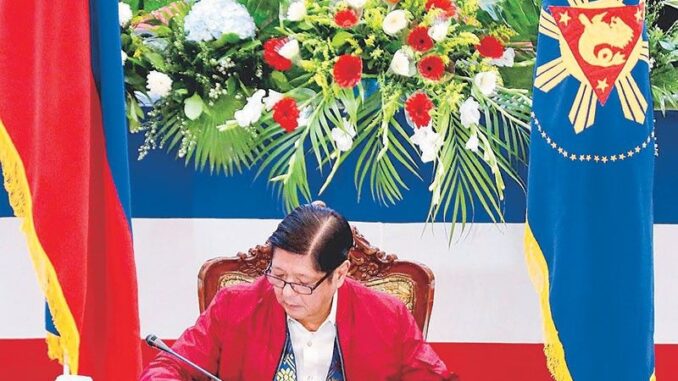
MANILA, Philippines — President Marcos is slated to sign into law the P6.532-trillion national budget for 2025 before Christmas.
“Following standard practice, the Congress-approved national budget bill will be transmitted to the Office of the President for review. The national budget for 2025 will be signed before Christmas Day,” the Presidential Communications Office (PCO) said in a statement.
PCO Secretary Cesar Chavez previously said the signing of the spending bill has been tentatively set for Dec. 20.
Militant lawmakers, meanwhile, are questioning what they considered the hasty ratification of the bicameral conference committee report on the approved budget.
In a manifestation, Kabataan Rep. Raoul Manuel of the Makabayan bloc questioned specifically the huge increase – from P158.7 billion to P531.7 billion – in the “unprogrammed appropriations” of the bicam-approved budget program.
“Do all the items slashed from the programmed appropriations like in education go here (unprogrammed appropriations)?” Manuel asked.
Manuel said he is questioning the bicam conference report “because we have seen new changes, not for the better, but to bring the country away from true progress.”
He also questioned the decrease in the budget of the Department of Education (DepEd), while taking note of the increase in the P7 billion budget for state colleges and universities (SUCs).
ial Welfare and Development (DSWD), Department of Labor and Employment (DOLE), Department of Agriculture (DA) and the National Irrigation Authority (NIA).
PhilHealth’s zero subsidy
The Kabataan representative also cited the “big challenge” facing the Philippine Health Insurance Corp. (PhilHealth), which would be receiving zero subsidy based on next year’s budget.
“While this zero budget for PhilHealth is a big challenge for this agency to live up in expectations to it, it is surprising why there is a cut in the budget of the DOH. So how can we expect to have better health care services if there is a P25.8 trillion peso budget cut in DOH as compared to the bicam version of NEP (National Expenditure Program) in our national budget?” Manuel said.
For Senate President Francis Escudero, the zero subsidy for PhilHealth under the approved budget program should serve as wakeup call for underperforming agencies.
“For such blunder, this should serve as a wakeup call to them, if not a slap in the face to make them do their job. It’s not right to reward them for their blunder by giving them money which they will not use anyway,” Escudero said.
He scored the health insurer for not having a single patient avail of zero balance billing despite its P600 billion allocation.
Bato ‘misinformed’
Meanwhile, Tingog party-list Rep. Jude Acidre said Sen. Ronald dela Rosa was “misinformed” about his criticism of its memorandum of agreement (MOA) with PhilHealth and the Development Bank of the Philippines (DBP).
On Wednesday, Dela Rosa said he was wondering why PhilHealth and DBP would choose to partner with a party-list and not with the DOH in the development and rehabilitation of health facilities.
“It is worth asking why Senator Dela Rosa is so fixated on attacking this program, which is designed to uplift underserved communities. Could this be an attempt to deflect attention from the House investigation into extrajudicial killings during his time as police chief? His sudden concern for governance and ethics appears more like a smokescreen to distract from his own accountability issues than a genuine critique of the MOA,” Acidre said.
“Tingog Partylist’s participation in this initiative is rooted in its mission to improve access to health care, especially in underserved and rural communities. This initiative is not about power or control but about facilitating solutions for local government units (LGUs) to enhance public health care services,” Acidre explained.
He said the MOA outlines Tingog’s role in supporting LGUs by helping them access DBP’s financial mechanisms, and provide “fiscal training, capacity building and other initiatives to allow LGUs access to DBP’s credit facility, as well as “direct medical assistance” to patients.
Acidre said Tingog’s involvement is strictly facilitative and does not infringe on the mandates of government agencies.
“Tingog Partylist does not handle funds, manage projects, or encroach upon the functions of the Department of Health or the Department of the Interior and Local Government. These agencies remain central to national health care programs,” he stressed.
He rejected Dela Rosa’s criticisms, including claims that the initiative bypasses government agencies.
“The MOA does not bypass these agencies. Tingog complements, not replaces, their mandates,” Acidre clarified. “On accusations of politicization. Tingog’s involvement is grounded in service, not politics.
“The MOA adheres to all legal protocols. The financial arrangements are strictly between DBP and LGUs, and no funds are transferred to Tingog. The ethics of this partnership should be measured by its intent and outcomes, not by Dela Rosa’s baseless speculations,” he added.
He called on Dela Rosa to recognize the true purpose of the initiative.
“Instead of politicizing a well-intentioned initiative, Senator Dela Rosa should focus on addressing the lingering questions about his past and how it has affected the lives of countless Filipinos. Tingog, for its part, remains committed to serving the people, especially those in rural areas who have long been neglected,” Acidre said.
“We call on the public to see through this distraction and focus on what truly matters: ensuring that health care reaches every Filipino, regardless of political noise. Public service should always prioritize the welfare of the people, not personal or political agendas,” he concluded. – Alexis Romero, Cecille Suerte Felipe





Be the first to comment